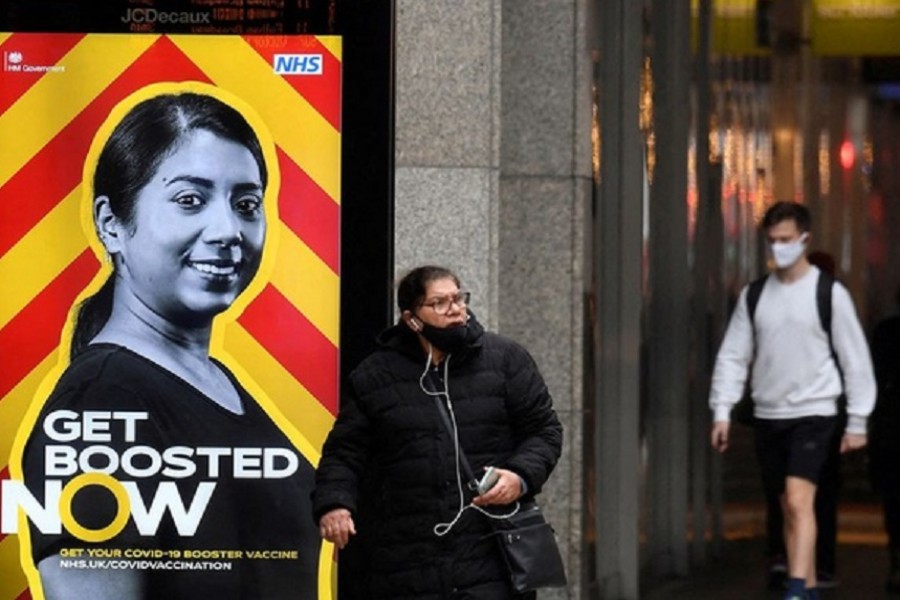Two vaccine makers said their shots protected against the omicron coronavirus variant as UK data suggested it may cause proportionally fewer hospital cases than the Delta strain, though public health experts warned the battle against COVID-19 was far from over, according to Reuters.
Similar encouraging evidence about hospitalisation rates had emerged from South Africa on Wednesday, but the head of Africa's main public health agency joined the World Health Organization in cautioning that it was too soon to draw broad conclusions about Omicron's virulence.
"Let's be careful not to extrapolate what we are seeing in South Africa across the continent, or across the world," Africa Centres for Disease Control (CDC) chief John Nkengasong told a media briefing.
Coronavirus infections have soared across much of the world as highly infectious omicron has spread, triggering new restrictions in many countries.
First identified last month in southern Africa and Hong Kong, the variant is quickly becoming dominant in much of western Europe including Britain, where daily new infections have soared beyond 100,000.
But increases in hospitalisations and deaths in South Africa and Britain since omicron took hold appear to have been more gradual, and AstraZeneca and Novavax have joined other vaccine manufacturers in saying their shots protect against it.
University of Edinburgh researchers who tracked 22,205 Omicron patients said on Wednesday the number who needed to be hospitalised was 68 per cent lower than they would have expected, based on the rate in patients with Delta.
Imperial College London researchers said they saw evidence over the last two weeks of a 40-45 per cent reduction in the risk of hospitalisation for Omicron relative to Delta.
'DON'T OVER-INTERPRET'
Raghib Ali, senior clinical research associate at the University of Cambridge, said scientists had warned that, with the surge in UK cases, even a small proportion of hospitalisations could overwhelm the heathcare system.
However, the UK data was encouraging and "may help justify the government's decision not to expand restrictions on social gathering over Christmas in England", he said.
UK hospitalisations supported Wednesday's findings from South Africa's National Institute for Communicable Diseases (NICD).
However, the CDC's Nkengasong said the NICD data, suggesting Omicron was 70-80 per cent less severe than Delta, should be interpreted "with a lot of caution".
"This is early days and public health practice is local," he said, adding that particular factors such as the young median age of the South African population could be in play.
On Wednesday, the WHO's technical lead on COVID-19, Maria van Kerkhove, had said data on Omicron was still too "messy" to draw firm conclusions.
VACCINE HOPES
On Thursday, AstraZeneca said a three-course dose of its COVID-19 vaccine offered protection against the variant, citing data from an Oxford University lab study.
Findings from the study, yet to be published in a peer-reviewed medical journal, match those from rivals Pfizer-BioNTech, and Moderna.
The study on AstraZeneca's vaccine, Vaxzevria, showed that after a three-dose course, neutralising levels against Omicron were broadly similar to those against Delta after two doses.
Hours earlier, Novavax Inc said early data showed its vaccine - authorised for use this week by the European Union and WHO but yet to be approved by the United States - also generated an immune response against omicron.
As financial markets welcomed the signs that omicron might be less severe than feared, global shares extended a rally on Thursday while safe-haven bonds and currencies eased.
Beyond western Europe, the delta variant continued to spread.
The coronavirus death toll in Russia, where officials said this week they had detected only 41 omicron cases, passed 600,000 on Thursday, Reuters calculations based on official data showed, after a surge of infections linked to Delta.
Only the United States and Brazil have recorded more coronavirus deaths.
The Chinese city of Xian, where no Omicron cases have been detected, put its 13 million residents in a lockdown as the daily count of domestically transmitted COVID-19 infections rose for a sixth day running.


